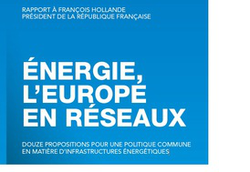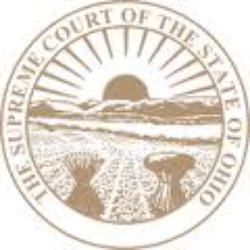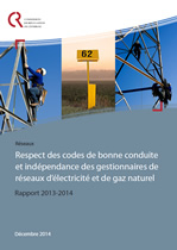Sectors
Compliance and Regulation Law Glossary

March 27, 2018
Breaking news

March 7, 2015
Bibliographic Reports : Books

It is often argued that energy because it is a matter of sovereignty and because it is rooted in the territory, returns to the State. But it is resolutely towards Europe that Michel Derdevet pulls the whole system.
Probably by conviction, by will of a strong Europe and because there has economic power only when propped on energy. However, an energy system that is up by networks as in energy, we never doubted the convergence between the container and the content, meaning that the energy source is irrelevant whitout being carried, whitout being 'provided to users.
This construction of the networks is political and it is in terms of "mesh" that the report Michel Derdevet just submitted to the President of the Republic, François Hollande, presents a European project. In a way, it is not "revolutionary", as it is to finally fulfill the will of those who conceived Europe in 1945 through the coal, steel and energy, to a common Europe from which built the industry, not only for the reconstruction of Europe but for its economic dynamism and its common security policy.
In this, the European network of the transportation of electricity is essential. Yet it is to be done because the legislation of the European Union rather liberalized energy markets whitout building Europe of energy, leaving remaining national specificities. The result is what Michel Derdevet rightly called "inertia".
He therefore proposes the establishment of an "European industrial project." In this context, Michel Derdevet requires better definition of "model of norms and regulation", aiming in particular the structure of tariffs that include or not the R & D according to the Member States, claiming the alignment of the tasks of network operators and a price guarantee for users, which would facilitate investment. He stressed that national regulatory differences hinder the development of smart grids (and therefore the European market). Without a convergence of regulations, interoperability is not optimal, as it would allow Europe to be a major global player in energy.
Michel Derdevet therefore advocates regulation that goes to both a stronger European articulation, but at the same time which must be more "decentralized", for users to make better use of new uses of energy through the action of regulators they are close.
It is true that we are very far off ...
This is why the author asks what one favors "regulatory convergence". This is not only to harmonize rules but also to redirect them to detach the competitive prism to direct them to the long-term financing.
It is true that Europe's energy, without which a single industrial space can hardly be, can not actually do if the regulation does not resolutely takes over the principle of competition, competition remaining in the moment of exchange, while the Regulation is in the long term and what to take to designate as "industrial policy" which is nothing but a form of expression of the Political.
So what Michel Derdevet request, what ever that finally the arrival of a political Europe, the need for it finds its place in the global competition.

Feb. 17, 2015
Translated Summaries : 05. Energie

In regulatory law, municipalities are very important, as consumers but also as issuers standards. They can do this through contracts but also by unilateral standards such orders.
This power of municipalities is coming to a halt by the decision taken 17 February 2015 by the Supreme Court of the State of Ohio,, State of Ohio ex rel. Jack Morrison Jr., Law Director for City of Munroe Falls, Ohio v. Beck Energy Corp.
Indeed, a municipal law had made provisions for imposing rules on location, drilling and well operations and gas. These provisions were contrary to the law of the State of Ohio.
In its judgment of 17 February 2015, the state Supreme Court considers that this is enough to make the first non-compliant text of the Constitution because it is not possible for a local authority to exercise normative power by contradicting a state standard.
The stakes are certainly legal and lies in the implementation of the hierarchy of norms. But it is also political: in energy, due to the power of the operators, which is most likely not to be captured by the sector? The political power of the state or the political power of municipalities?
As suggested by one of the judges, must be taken into consideration which of the two powers depends most operators in the financing of campaigns.
Factual and determinant consideration, specific element of the US, an element which Kelsen couldn't think .....

Jan. 22, 2015
Sectorial Analysis

A simple question: be regulator, is it a profession?
As soon as one asks the question, it should be down. Indeed, the time has passed when the regulator was a natural person. Today, in most cases, the regulator takes the form of a Regulatory Authority, that is to say an entity with or without legal personality, incorporated in the State or professional.
Individuals appear as a member of the Authority, even if it is true that the President of the Regulatory Authority often has a very importan role!footnote-17.
The choice of Commissioners is crucial to the independence and effectiveness of the regulatory authority. It is appropriate that the person has "authority" over the area, must be respected and participates effectively in the collective action of the College.
Let us try to recall the two sets of criteria to determine how one thinks the "good regulator" before taking such case the appointment of Mr. Yann Padova as a new member of the College of the Commission de Régulation de l'Énergie (French Energy Regulatory Commission).

Jan. 8, 2015
Breaking news

The French law provides that the Commission de Régulation de l'Énergie - CRE (French Regulatory Energy Commission) publishes an annual report on compliance with codes of conduct and independence of the power transmission grid operators. In Decembre 2014, CRE has published its report on compliance with codes of conduct and independence of electricity networks and natural gas (Respect des codes de bonne conduite et indépendance des gestionnaires de réseaux d'électricité et de gaz naturel).
This particular statutory provision shows the proximity between Regulation and Governance, nearby sometimes believed limited to the sphere of banking and finance.
This is designed especially for managers of transport networks which are often subsidiaries of incumbents production and energy sales, economic and legal integration that the law does not prohibit even though it requires independence transport network managers. This independence must be de facto and not de jure, which is a higher requirement than mere legal autonomy of companies, the result of the requirements of "governance", the operator is obliged not to exercise the rights and powers its parent company status yet gives a regular basis so that the first principle of independence of the network manager is preserved.
The relationship between the controlling shareholder and its subsidiary are governed by "codes of conduct" in the mandatory order of the independence of management and decision making of the subsidiary. In a 90-page reportthe regulator sets the constraints so that this goal leads in effect on the parent company, beyond corporate law.
However, the regulator is very severe. It believes that the way in which subsidiaries present themselves to consumers mark such similarity with their parent that these third parties can't identify them as independent of them. According to the regulator, consumers therefore don't identify them as carriers or distributors of energy also offered by competitors of their parent.
Thus, the regulator considers it necessary that these subsidiaries will change their brands, logos and legal designation, eg ERDF ceases to have a name so close to EDF.
The implicit question is the legal effect of such reproaches and suggestions, if the companies aren't listening. The report discusses the prospect to bring the question before their independent body able to impose sanctions. But the case will be difficult because the principle of independence meets the principle of freedom and the terms of the interference between regulatory law and corporate law aren't yet clearly established.
Updated: Sept. 25, 2012 (Initial publication: Sept. 25, 2012)
Thesaurus : Doctrine

Updated: Sept. 25, 2012 (Initial publication: July 15, 2012)
Sectorial Analysis

ENGLISH
In Belgium, the Flemish Region had adopted the Decree of 23 December 2010 to exemp those providing electricity with a renewable source to pay the rate of injection into the electricity transmission network. The Region stated that it was not an act tariff, thus falling under its jurisdiction. The decree, attacked by the energy regulator before the Belgium Constitutional Court, was canceled by the latter in a ruling dated July 12, 2012, because it is an act of pricing, under the only federal competence.
FRENCH
En Belgique, la Région flamande avait adopté le décret du 23 décembre 2010 pour exempter les producteurs d'électricité ayant pour source une énergie renouvelable du payement dû au titre de l'injection de l'électricité dans le réseau de distribution. La Région posait qu'il ne s'agit pas d'un acte de tarification, et que cela relevait donc de sa compétence régionnale. Ce décret, attaché par le Régulateur de l'Energie devant la Cour Constitutionnelle de Belgique, a été annulé par celle-ci dans une décision en date du 12 juillet 2012, parce qu'il s'agit bien d'un acte touchant à la tarification, pour laquelle seul des organes fédéraux sont compétents.
Updated: Sept. 25, 2012 (Initial publication: July 11, 2012)
Sectorial Analysis

ENGLISH
After suspending the freeze of gas prices for consumers, the "Conseil d’Etat" (French Council of State) in a judgment of 10 July 2012, cancels the freeze, as it constitutes an error of law, because it shows that the Government has not incorporated or offset procurement costs borne by the public service provider.
FRENCH
Après avoir suspendu le gel des tarifs gaiers pour les consommateurs, le Conseil d’Etat, dans un arrêt du 10 juillet 2012, a annulé l’arrêté qui avait imposé ce gel, en ce qu’il constitue un erreur de droit, parce qu’il montre que le Gouvernement n’avait pas incorporé ou offert de compenser les coûts supportés par le fournisseur de service public.
Updated: Sept. 25, 2012 (Initial publication: June 9, 2012)
Sectorial Analysis

TRANSLATED SUMMARIES
ENGLISH
In France, the Minister of Ecology has issued an Order to facilitate the
purchase of electricity generated by wind. The text is being challenged
before the "Conseil d’Etat" (State Council) for illegality, in that it
constitutes state aid. The State Council considers the matter serious
enough to suspend the proceeding and seized the Court of Justice of the
European Union of a preliminary question on 15 May 2012.
FRENCH
En France, le ministre de l’Ecologie a émis une ordonnance afin de faciliter l’achat de l’électricité produite par le vent. Le texte est actuellement contestée devant le «Conseil d’Etat" (Conseil d’Etat) pour cause d’illégalité, en ce qu’elle constitue une aide d’Etat. Le Conseil d’Etat considère que l’affaire suffisamment grave pour suspendre la procédure et saisi la Cour de justice de l’Union européenne d’une question préjudicielle le 15 mai 2012.
Updated: Sept. 25, 2012 (Initial publication: April 11, 2012)
Sectorial Analysis

Translated summaries
The translated summaries are done by the Editors and not by the Authors.
ENGLISH
The 12th General Assembly of the Association of Mediterranean Regulators
for Electricity and Gas (MEDREG) was held at the headquarters of the
Greek Regulatory Authority of Energy (RAE), on 14 December 2011. On this
occasion, members of MEDREG have approved the initial proposals made by
the Task Force devoted to investments in energy infrastructure, aiming
to stimulate investment in the Mediterranean region. The MEDRED also
exercises regulatory powers similar to those of ACER.
FRENCH
La 12ème Assemblée Générale de l’Association des Régulateurs Méditerranéens de l’Electricité et du Gaz (MEDREG) s’est tenue au siège de l’Autorité grecque de Régulation de l’Energie (RAE), le 14 décembre 2011. A cette occasion, les membres de MEDREG ont approuvé les premières propositions émises par la Task Force consacrée aux investissements dans les infrastructures énergétiques, ayant pour objectif de stimuler les investissements dans la région de la Méditerranée. La MEDRED exerce en outre des pouvoirs de régulation analogues à ceux de l’ACER.
Other translations forthcoming.
Updated: Sept. 25, 2012 (Initial publication: Jan. 13, 2012)
Sectorial Analysis

Main information
On December 20, 2011, the European Commission adopted a decision based on the Almark ruling that expounds upon the four conditions necessary so that compensation paid by a State to any state-owned or private company entrusted with the operation of a public service not require prior notification of the European Commission, despite the general prohibition on State Aids. Each state has a wide margin of discretion in the definition of services that could be classified as being services of general economic interest. A communication and de minimis regulation will complete this decision.
Updated: Sept. 25, 2012 (Initial publication: Jan. 4, 2012)
Sectorial Analysis

Translated Summaries
In The Journal of Regulation the summaries’ translation are done by the Editors and not by the authors
ENGLISH
On November 28, 2011, the French Council of State issued a summary judgment suspending the Government price freeze on household natural gas prices because the ‘price scissors’ effect it had was harming competition, and because no superior legal norm justified the freeze.
FRENCH
Le 28 Novembre 2011, le Conseil d’Etat a rendu une Ordonnance de référé, suspendant le gel des prix du gouvernement concernant les prix domestiques du gaz naturel, car l’effet de «ciseaux des prix" avait pour effet de nuire à la concurrence, et parce qu’il n’existe pas de norme juridique supérieure justifiait ce gel des tarifs par un décret.
SPANISH
El 28 de noviembre de 2011, el Consejo de Estado francés emitió una orden judicial de congelación del precio del gobierno sobre los precios internos del gas natural, porque el efecto del "precio de tijeras" efecto fue el de perjudicar a la competencia, y porque no existe una norma legal que justifica el congelamiento de las tarifas por decreto.
ITALIAN
Il 28 novembre 2011, il Consiglio di stato francese ha reso una sentenza sommaria in cui ordina la sospensione de gelo dei prezzi del gas naturale per le famiglie, previsto precedentemente dal governo, l’effetto “forbice prezzi” causato da tale decisione stava causando danni alla libera concorrenza e poiché tale decisione di gelare i prezzi non era fondata su nessuna norma legale superiore.
SPANISH
El 28 de noviembre del 2011, el Conseil d’Etat (Consejo de Estado de Francia) decidió que la prohibición de los OGM establecido por varias decretos ministeriales en diciembre 2007 y febrero 2008 no son válidos. La razón principal detrás de esta decisión es la falta de prueba suficiente dada por el gobierno francés que los OGM representan una gran amenaza a la salud pública y el ambiente. No obstante, los Ministros de Agricultura y Ambiente declararon el 13 de enero 2012 que esta misma prohibición será adoptada.
........................
Other translation forthcoming.
Updated: Sept. 25, 2012 (Initial publication: Dec. 5, 2011)
Sectorial Analysis

Translated Summaries
In The Journal of Regulation the summaries’ translation are done by the Editors and not by the authors
ENGLISH
The European Commission issued a reasoned opinion on November 24th, 2011, to France and the Czech Republic demanding that those countries modify their legislation in order to comply with European regulation on renewable energies. If the modifications are not implemented in the upcoming two months, the Commission will open a case before the European Court of Justice.
FRENCH
La Commission européenne a émis un avis motivé le 24 Novembre 2011, concernantla France et la République tchèque, exigeant que ces pays modifient leur législation afin de se conformer à la réglementation européenne sur les énergies renouvelables. Si les modifications ne sont pas mises en œuvre dans les deux prochains mois, la Commission ouvrira une procédure devant la Cour de justice de l’Union européenne
ITALIAN
Il 24 novembre 2011, la Commissione europea ha emesso una raccomandazione con cui richiede alla Francia ed alla Repubblica Ceca di modificare le proprie legislazioni in modo tale da conformarle alla regolamentazione europea in materia di energia rinnovabile. Se le modifiche non saranno introdotte entro i prossimi due mesi, la Commissione adirà la Corte di Giustizia Europea.
....................
Other translations forthcoming.
Updated: Sept. 25, 2012 (Initial publication: Oct. 7, 2011)
Sectorial Analysis

Translated Summaries
In The Journal of Regulation the summaries’ translation are done by the Editors and not by the authors
ENGLISH
Thematic Report (Energy): The French energy regulator publishes its first unfavorable opinion regarding the government’s proposed natural gas tariffs for residential customers.
The Commission de Régulation de l’Energie (CRE — French energy regulator) published an opinion “regarding the draft executive order regarding the regulated tariffs for natural gas publicly distributed by GDF Suez.” This non-binding opinion was published on September 29, 2011, and claims that it is not acceptable for the Government to leave natural gas prices unchanged because these prices do not cover GDF Suez’s costs and symmetrically prevent newcomers from competing with it.
ITALIAN
Relazione tematica (Energia): L’autorità di regolazione francese nel settore dell’energia ha reso pubblica il suo primo parere sfavorevole a proposito delle tariffe del gaz proposte dal governo per le utenze residenziali
La Commission de Régulation de l’Energie (CRE – l’autorità francese di regolazione nel settore dell’energia) ha reso pubblico un parare « riguardante la bozza di proposte di tariffe per il gaz naturale distribuito da GDF Suez ». Questo parere non vincolante è stato pubblicato il 29 settembre 2011 e afferma che non è possibile per il Governo di lasciare immutati i prezzi del gas naturale poiché questi prezzi non coprono i costi di GDF Suez e, al contempo, impedisce ai nuovi operatori di competere con tali costi.
.....................
Other translations forthcoming.
Updated: Sept. 25, 2012 (Initial publication: July 8, 2011)
Sectorial Analysis

Main information
The technique of “effacement diffus” [diffuse effacement] is when a number of electricity consumers agree beforehand to consume less electricity at certain times (effacement), which allows other consumers to use the network at peak hours. Corporate intermediaries arrange these diffuse effacements, thereby participating in the adjustment system vital to the security of the electricity distribution network. The Commission de Régulation de l’Energie (CRE – French energy regulator) organized the system of “diffuse seffacement” even though this measure was not contained in statute. The Conseil d'Etat (French Council of State)’s Voltalis ruling, handed down on May 3, 2011, recognizes the CRE’s right to organize this system. But, it also deems that the regulator exceeded its powers by mandating that the corporate intermediaries organizing diffuse effacement remunerate the electricity provider.
Updated: Sept. 25, 2012 (Initial publication: May 9, 2011)
Sectorial Analysis

ENGLISH
On April 7, 2011, the Belgian Council of State handed down a ruling (n° 212.557) in which it overruled a decision by the Commission de Regulation de l’Electricité et du Gaz (CREG – Belgian Regulatory Commission for Electricity and Gas) to fine the City of Wavre for non-compliance with its annual reporting obligations.
GERMAN
Thematischer Bericht (Energie): Der belgische Bundesrat kippt ein von der belgischen Regulierungsbehörde für Elektrizität und Gas beschlossenes Bußgeld
Am 7. April 2011 beschließt der Belgische Bundesrat per Gerichtsentscheid (n° 212.557) die Entscheidung der Kommission für Regulierung von Elektrizität und Gas (CREG – Belgian Regulatory Commission for Electricity and Gas) umzustoßen, welche der Stadt Wavre ein Bußgeld für nicht-Einhaltung der jährlichen Berichtspflicht auferlegte.
PORTUGUESE
Informe temático (Energia): O Conselho de Estado belga anulou multas impostas pela Comissão regulatória belga para eletricidade e gás.
Em 7 de abril de 2011, o Conselho de Estado belga publicou julgamento (nº 212.557) no qual ele anulou uma decisão da Commission de Regulation de l’Electricité et du Gaz (CREG – Comissão regulatória belga para eletricidade e gás) em que a cidade de Wavre foi multada pelo descumprimento de suas obrigações de divulgação de informes anuais.
ITALIAN
Relazione tematica: Il Consiglio di Stato belga abroga la multa fatta dalla Commissione di regolazione per il gas e l’elettricità
Il 7 aprile 2011, il Consiglio di Stato belga ha reso una decisione (n° 212.557) nella quale dichiara illegittima una decisione della Commissione di regolazione del gas e delle’elettricità (CREG - Commission de régulation de l’électricité et du gaz) che aveva previsto una multa alla città di Wavre per inadempienza agli obblighi di rendiconto annuale.
Other translations forthcoming.
Updated: Sept. 25, 2012 (Initial publication: Jan. 10, 2011)
Sectorial Analysis

Fiche thématique (Finance, Environnement, Energie): Exécution d’un accord de coopération passé entre les régulateurs français de l’énergie et des marchés financiers concernant la régulation du marché des émissions de carbone.
Le 10 décembre 2010, la Commission de Régulation de l’Energie (CRE) ET L’Autorité des Marchés Financiers (AMF) ont signé un accord de coopération. La coopération entre ces deux régulateurs sectoriels a lieu dans un cadre plus général de réflexion sur une meilleure, voire future, régulation du marché des permis d'émission de CO2, et vise plus particulièrement ce but
GERMAN
Thematischer Bericht (Finanz, Umwelt, Energie): Erfüllung eines Kooperationsvertrages zwischen den französischen Energie- und Finanzdienstleistungsaufsichtsbehörden bezüglich auf der Regulierung vom Emissionsrechtehandel.
Am 10. Dezember 2010 haben die the Commission de Régulation de l’Energie (CRE – die französische Energieregulierungsbehörde) und die Autorité des marchés financiers (AMF – die französische Finanzdienstleistungsaufsichtbehörde) eine Vereinbarung geschlossen. Die Zusammenarbeit zwischen beiden Behorden ist Teil einer breiteren Überlegung über eine bessere, sogar zukünftige Regulierung des Emissionsrechtehandels – und zielt besonders darauf.
Informe temático (Finanza, Ambiente, Energía): Ejecución de un acuerdo de cooperación entre los reguladores franceses de finanza y de energía en relación a la regulación del mercado para las cuetos de emisión de gas de carbono.
El 10 de diciembre del 2010, la Commission de Régulation de l’Energie (CRE- La Comisión francesa de la regulación de energía) y la Autorité des marchés financiers (AMF – La Autoridad francesa de los mercados financieros) entraron en un memorándum de entendimiento (MoU). La cooperación entre estos dos reguladores basados en sectores distintos, es, primordialmente, centrado sobre el trasfondo, o bien, tiene como objetivo, una mejor regulación del mercado para las cuotas de emisiones de CO2 y se centre en dos principios (…).
Updated: Sept. 25, 2012 (Initial publication: Sept. 15, 2010)
Sectorial Analysis

Click here to access the full-text article
Click here to access the full-text article
Thematic Report (Energy): The Swiss Federal Administrative Tribunal ruled on July 8th, 2010, that ElCom, the Swiss energy regulator, had overridden its powers in its decision of March 6th 2009.
In a decision of July 8th 2010, the Bundesverwaltungsgericht (the Swiss Federal Administrative Tribunal) partially amended a decision of the Eidgenössiche Elektrizitätskommission (ElCom, the Swiss Federal Electricity Commission), stating that it is unconstitutional and illegal for power-plant operators to bear the price of “system-services”.
FRENCH
Fiche thématique (énergie) : Le tribunal fédéral administratif suisse a rendu un arrêt le 8 juillet 2010 contre une décision du 6 mars 2009 de l'ElCom, le régulateur suisse de l'énergie, pour excès de pouvoir
Dans un arrêt du 8 juillet 2010, le Bundesverwaltungsgericht (le Tribunal Fédéral Administratif suisse) a partiellement annulé une décision de l'Eidgenössiche Elektrizitätskommission (ElCom, la Commission fédérale suisse de l'électricité), déclarant qu'il est anticonstitutionnel et illégal que les opérateurs des centrales électriques supportent le coût des "services systémiques"
GERMAN
Thematischer Bericht (Energie): das schweizerische Bundesverwaltungsgericht hat am 8. Juli 2010 die Verfügung der ElCom, die Eidgenössische Elektrizitätskommission, die Schweizer Regulierungsbehörde für Elektrizität, vom 6. März 2009 für ungültig erklärt.
In einer Entscheidung vom 8. Juli 2010 hat das Schweizer Bundesverwaltungsgericht eine ElCom-Verfügung vom 6. März 2010 zum Teil für ungültig erklärt, da die in der Verordnung vorgesehene Anlastung der Systemdienstleistungskosten an die Kraftwerke gesetzeswidrig ist.
SPANISH
Informe Temático (Energía): El Swiss Federal Administrative Tribunal (El Tribunal administrativo federal de Suiza) dictó el 8 de julio 2010 que ElCom, el Regulador suizo de energía, había sobrepasado sus poderes en su decisión del 6 de marzo 2009.
En una decisión del 8 de julio 2010, el Bundesverwaltungsgericht (El Tribunal administrativo federal de Suiza) anuló parcialmente la decisión de Eidgenössiche Elektrizitätskommission (ElCom, la Comisión suiza de electricidad federal) constatando que es inconstitucional e ilegal que las operadoras de centrales eléctricas soporten el precio de “servicios sistemáticos.”
Updated: Sept. 25, 2012 (Initial publication: June 11, 2010)
Sectorial Analysis

Updated: Sept. 25, 2012 (Initial publication: June 3, 2010)
Sectorial Analysis

Updated: Sept. 25, 2012 (Initial publication: May 21, 2010)
Sectorial Analysis

The European Commission conducted a competition inquiry on the competitiveness of European energy markets, because it believed that these markets functioned poorly, especially because they are insufficiently open to competition and their prices are too high. Proceedings were begun in December 2009 against E.ON, and were closed by this corporation’s May 4, 2010 legally-binding commitments to the European Commission to improve its competitors’ access to its natural gas transportation network. Access to transportation networks, which are essential facilities, is the heart of any regulatory system, and if access was not organized beforehand (ex ante), it can be arranged afterwards (ex post), as is the case in this affair, via an alliance between Competition Law and Contract Law, wherein the commitments take on the form of a sort of co-regulation (cf. infra brief summary)
FRENCH
Par une décision du 4 mai 2010, la Commission Européenne a accepté le les engagements proposés par la société énergétique allemande E.ON d’ouvrir davantage à ses concurrents l’accès à son réseau de transport de gaz.
La commission européenne a mené en 2007 une enquête sectorielle sur le fonctionnement concurrentiel des marchés énergétiques européens en estimant que ceux-ci fonctionnent mal, notamment puisqu’ils sont peu ouverts et leurs prix trop élevés. Une procédure ouverte en décembre 2009 contre E.ON est ici close par l’engagement de celle-ci envers la commission européenne d’ouvrir à ses concurrents son réseau de transport de gaz. L’accès au réseau de transport, facilité essentielle, est le cœur du système de régulation et s’il ne se fait pas {ex ante} il peut se faire alors {ex post}, comme on le voit dans cette affaire, par une alliance entre le droit de la concurrence et le droit du contrat, l’engagement devenant une sorte de corégulation (voir infra dans le bref commentaire).
GERMAN
Die Europäische Kommission hat am 4. Mai 2010 ein Beschluss veröffentlicht, in dem sie die Zusage des deutschen Energiekonzerns E.ON, der Konkurrenz effektiven Zugang zu seinen Gasleitungen zu öffnen, für verbindlich erklärt.
Die Europäische Kommission hat eine kartellrechtliche Untersuchung im Energiesektor durchgeführt, da sie die europäischen Energiemärkte für ineffizient hielt, vor allem aufgrund mangelnden Wettbewerbs und zu hohen Preisen. Mit dem Beschluss vom 4. Mai 2010 werden die von E.ON angebotenen Verpflichtungen, den Zugang zu den Gasnetzwerken für potentielle Konkurrenten zu öffnen, für rechtlich bindend erklärt. Zugang zu Transportnetzen, die als wesentliche Einrichtungen ({Essential Facilities}) zählen, ist zentral für jedes Regulatierungssystem. Wenn dieser Zugang nicht im Voraus ({ex ante}) organisiert ist, kann er trotzdem im Nachhinein ({ex post}) etabliert werden, wie es hier den Fall ist, durch ein Bündnis zwischen Wettbewerbsrecht und Vertragsrecht, indem das Unternehmen durch seine Verpflichtungen quasi mitregulierend wirkt (siehe unten {Brief Summary})
SPANISH
Updated: Sept. 25, 2012 (Initial publication: May 3, 2010)
Sectorial Analysis

The Commodity Futures Trading Commission (CFTC) published a proposition to regulate speculation through futures and option contracts on the over-the-counter energy market on January 26, 2010. This proposition is being challenged by the CME Group (the principal American futures market operator), which claims that the CFTC does not have a legal mandate to regulate over-the-counter trading in energy, because such action would have to be authorised by a specific law.
FRENCH
Rapport Sectoriel (Energie / Finance) : Le "CME Group" (principal opérateur de bourse de commerce aux Etats-Unis) conteste la proposition de "Commodity Futures Trading Commission — CFTC" (autorité de tutelle américaine des bourses de commerce) qui vise à réguler la spéculation sur les options et dérivés de l'énergie
La “Commodity Futures Trading Commission — CFTC” (l’autorité de tutelle américaine des bourses de commerce) publie le 26 janvier 2010 un projet visant à réguler la spéculation sur le marché de gré-à-gré énergétique. Cette proposition est vivement contestée par le CME Group (la principale bourse de commerce américaine), qui conteste que la CFTC n’est pas fondée légalement à réguler les échanges de gré-à-gré sur le marché de l’énergie, et qu’une telle compétence ne peut être accordée que par une loi spécifique.
SPANISH
El Grupo CME (operador principal de la bolsa de comercio americano) desafía la propuesta de la “Commodity Futures Trading Commission – CTFC” (la autoridad de tutela americana de la bolsa de valores) del 26 de enero del 2010 de regular la especulación sobre energías futuras, contratos de opciones y derivados.
La “Commodity Futures Trading Commission” - CFTC (la autoridad de tutela americana de la bolsa de valores) publicó el día 26 de enero del 2010 una propuesta para regular la especulación sobre el mercado extrabursátil de energía a través de contratos a futuro y a opciones. Esta propuesta está siendo fuertemente refutada por el Grupo CME (el operador principal de la bolsa de valores americano) quien declara que la CFTC no tiene la competencia legal para regular las operaciones extrabursátiles de energía, ya que tal acción tendría que ser autorizada por una ley específica.
GERMAN
Sektorialer Bericht (Energie / Finanz): Der CME Group (die Hauptwarenbörse Amerikas) hat sich gegen den Vorschlag der Commodity Futures Trading Commission (CFTC - die amerikanische Aufsichtsbehörde für Warenbörse) geäußert, die Spekulation auf außerbörslichen Energiemärkten zu regeln.
Die Commodity Futures Trading Commission (CFTC, die amerikanische Aufsichtsbehörde für Warenbörse) hat am 26. Januar 2010 eine Entwurfsarbeit veröffentlicht, in der sie ihre Absicht erklärt, die Spekulation auf außerbörslichen Energiemärkten zu regeln. Dieser Entwurf wurde vom CME Group stark kritisiert. Der CME Group, die Hauptwarenbörse in den VS, behauptet, dass die CFTC keinen rechtlichen Auftrag hat, solch eine Reglung einzuführen. Erst ein spezifistiches Gesetz würde es ermöglichen können, laut der CME Group.


